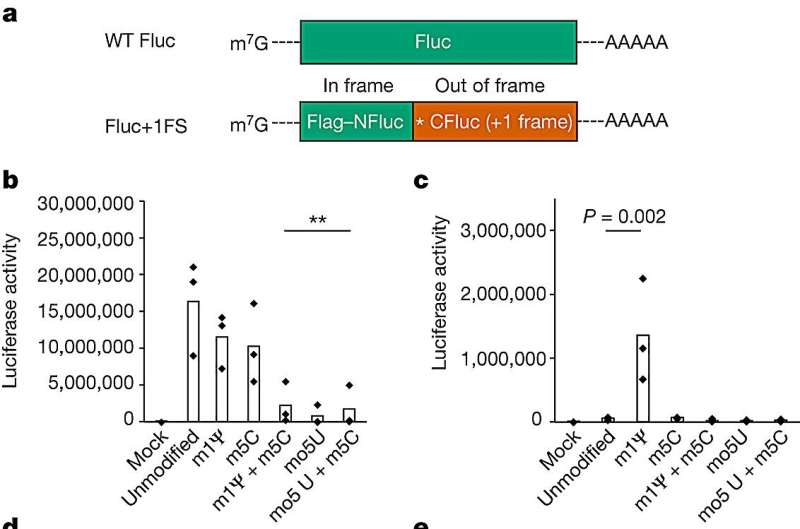This article has been reviewed according to Science X's editorial process and policies. Editors have highlighted the following attributes while ensuring the content's credibility:
fact-checked
peer-reviewed publication
trusted source
written by researcher(s)
proofread
mRNA COVID vaccines make 'unintended proteins'—researchers discover how to fix this problem

mRNA, a type of genetic material that provides the instructions your cells need in order to make proteins, used to be a term mainly used by scientists. But since COVID arrived, many of us are now familiar with it thanks to the mRNA-based vaccines.
The people behind the discoveries that made mRNA-based vaccines and treatments a possibility were awarded the Nobel Prize earlier this year. That work showed that some of the mRNA's chemical letters that make up its alphabet need to be switched out for synthetic equivalents for this technology to be viable.
However, these artificial versions are causing "unintended proteins" to be made and hence immune responses to these proteins. The question is now: can we prevent this? The answer is yes, we can. And it's a straightforward fix.
Vaccines using all-natural mRNA don't work. Our immune system recognizes them as foreign to the body and mounts a response to remove them, just like it would to any invading germ.
The Nobel prize-winning work of Katalin Karikó and Drew Weissman essentially gave the injected mRNA an invisibility cloak—the synthetic "letters"—preventing its detection and destruction by our immune system. This allows safe delivery of the mRNA to cells to do its job.
In the case of the COVID vaccines, our cells make the spike protein, and our immune system makes antibodies against it, protecting us from severe disease.
Micro-protein factories called ribosomes read the mRNA instructions to make proteins. They read the code three chemical letters at a time. Each triplet codes for an amino acid—a single building block of a protein.
The ribosome moves along to the next three letters and identifies which amino acid is next to be added to the growing protein. This repeats until it reaches the end of the mRNA instructions.
So where do the "unintended proteins" come from? They are created in the same way, but errors can occur if the ribosome reaches a string of these synthetic chemical letters in the mRNA.
The ribosome can slip, essentially losing its place in what it is reading. For instance, rather than reading THE CAT ATE THE FAT RAT, it reads the message as THE CAT A TET HEF ATR AT, resulting in the production of a different protein.
In a recent study, published in Nature, my colleagues and I revealed that these unintended proteins were produced in a third of the 21 people who participated in the study and were vaccinated with the Pfizer mRNA vaccine. Also, those people generated an immune response against these proteins.
Beyond the strength of the data from the original clinical trial, the safety of the Pfizer vaccine has been re-established by observing millions of vaccine recipients, and the benefits still outweigh the risks for those still recommended to receive it. So our latest study should not affect the safety assessment of existing mRNA COVID vaccines.
No evidence of harm
The data is clear: there is no evidence linking unintended proteins and immune responses with harm.
It's important to note that humans regularly encounter unintended proteins and generate harmless immune responses, as seen with proteins produced from our food or by harmless gut bacteria. These immune responses, which occur in all of us constantly, are controlled by our immune system to prevent them from causing damage to our bodies.
These unintended proteins arising from mRNA vaccines are not random. We know where errors can occur in the mRNA code and can fix them to prevent issues in future mRNA-based therapies.
Luckily, nature provides a fail-safe we can take advantage of. With only 20 different amino acids, but 64 possible sets of three chemical letters, more than one triplet codes for a given amino acid. When designing new mRNA therapeutics, triplets prone to errors can be identified using a simple algorithm and replaced with an alternative spelling of the same code—similar to "mum" and "mom".
MRNA therapies will be game-changing for medicine. They are easy to make, can be produced rapidly, and easily modified. Most excitingly, this technology could be used to treat a wide range of diseases, including cancer.
Cancer treatment has been revolutionized by immunotherapy—which uses the patient's immune system to fight the cancer, but its effectiveness varies. The main hope for making immunotherapy more successful lies in designing mRNA-based cancer vaccines that are personalized to the patient.
This finding raises the new possibility that unintended proteins could be generated by any mRNA therapeutic. Also, it is not possible to be sure that, in the context of cancer treatment, unintended proteins and the immune responses they trigger will be harmless. However, this discovery gives new insights into how these unintended proteins are generated and, most importantly, how modifications can be made to prevent these from arising.
More information: Thomas E. Mulroney et al, N1-methylpseudouridylation of mRNA causes +1 ribosomal frameshifting, Nature (2023). DOI: 10.1038/s41586-023-06800-3
This article is republished from The Conversation under a Creative Commons license. Read the original article.![]()




















